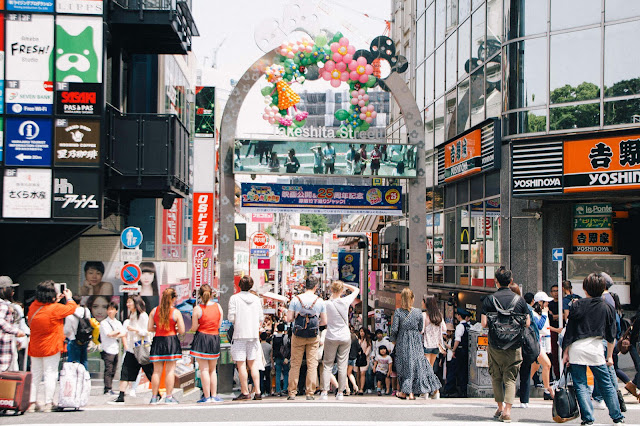Harajuku attracts many visitors with its Japanese pop culture and beautiful nature spots. It is the center of Japan's most extreme teenage cultures and fashion styles, but also offers shopping for adults and some historic sights.
Takeshita Dori
The symbol of Harajuku and birthplace of many of Japan's fashion trends, Takeshita Dori (Takeshita Street) is a narrow, roughly 400-meter long street lined by shops, boutiques, cafes and fast food outlets targeting Tokyo's teenagers. Because of the street's popularity, it becomes extremely busy and crowded on the weekends. Interesting shops and restaurants can also be found along some of the side streets.
Meiji Shrine
Meiji Shrine (Meiji Jingu) is a Shinto shrine dedicated to the deified spirits of Emperor Meiji and his consort, Empress Shoken. Emperor Meiji was a popular emperor who reigned from 1867 to 1912. The majority of the shrine grounds are composed of a beautiful, dense forest that can be explored on walking paths.
Yoyogi Park
Yoyogi Koen (Yoyogi Park) is one of Tokyo's largest and most pleasant city parks, featuring wide lawns, ponds and forested areas. It is a great place for jogging, picnicking and other outdoor activities. It is located next to Meiji Shrine. With an area of 54.1 hectares, you can enjoy the natural beauty of all four seasons on the vast park grounds. Visitors can spend their time watching the flowers, having picnics, playing music and enjoying sports in the park.
Omotesando Hills
Omotesando Hills, five minutes walk from Meiji Jingumae Station, is a shopping mall with a collection of Japanese brand boutiques. Within the facility, there are more than one hundred shops that handle unique and high-quality merchandise. The main building, with three sublevels and three floors above ground, has a central open air space with a unique design. It is surrounded by a spiraling slope. Feel free to come to Omotesando Hills to discover the newest urban Japanese fashion.
Ota Memorial Museum of Art
This art museum is specifically focused on ukiyo-e. Each month the museum selects artwork based on a theme and displays around 14,000 pieces. This includes work by representative ukiyo-e artists such as Utamaro Kitagawa, Hokusai Katsushika, and Hiroshige Utagawa. At the museum's souvenir shop you can buy tenugui hand towels printed with ukiyo-e art, as well as postcards. Both make great souvenirs. You can see various new pieces each time you visit so every visit will be a delight.
Nezu Museum
At the Nezu Museum, you are able to appreciate Japanese and Western artwork. Buddhist carvings that have become Important Cultural Properties, Japanese paintings designated as national treasures and various other highly acclaimed art pieces are on display here. The collection belongs to industrialist and tea ceremony master Kaichiro Nezu. Nezu Museum’s other appealing point is its Japanese garden. Within the vast garden, there is a teahouse comprised of four buildings. After enjoying at the artwork, we recommend taking a stroll through the garden.
Oriental Bazaar
This is one of Tokyo's largest souvenir shops, very popular among foreign travelers in search of typical Japanese souvenirs, such as kimono, tableware, lamps, dolls, furniture and samurai related goods. The shop spans three floors and has a red and green facade that mimics traditional Japanese architecture. Travelers who pass by the storefront are sure to notice the building. Moreover, a thing that you need to notice that it is closed on Thursdays.
Source Internet







